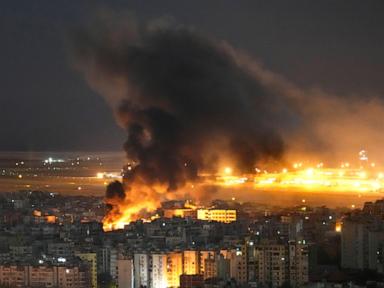More than brute force is needed to upset Hezbollah's financial network

Israel recently attacked banks in Lebanon it alleges are part of the financial network that supports Iran-backed terror group Hezbollah (a member of the Lebanese government). While Israel is great at the blowing-up aspect of fighting Hezbollah’s financial network, a bank is just a building, a mailing address — not “the network.”
The U.S. government has been working to disrupt Hezbollah's financial network since it designated the group a Foreign Terrorist Organization in 1997, part of a broader strategy to weaken the group’s operational capabilities and reduce its influence.
Among the tools used by the U.S. are:
- Sanctions and financial alerts: The U.S. Department of the Treasury has imposed sanctions on individuals and entities involved in financial operations with Hezbollah ties. These sanctions are designed to restrict Hezbollah's access to the global financial system. In addition, the Financial Crimes Enforcement Network (FinCEN) has issued alerts to financial institutions to help them identify and report suspicious activities related to Hezbollah.
- International cooperation and targeting financial networks: The U.S. has coordinated with other countries, such as Qatar, to impose sanctions on Hezbollah financiers. Also, the U.S. has targeted Hezbollah's financial networks, including those involved in oil smuggling, money laundering, and illegal weapons procurement.
Hezbollah’s network works in various business lines — not just in the Middle East, but in Africa, Asia, Europe and the Western Hemisphere. The network has engaged in narcotics trafficking, oil smuggling, arms dealing, counterfeiting, black market money exchange, and the money laundering required to remit the profits to Hezbollah headquarters.
Hezbollah’s support network isn’t just facilitating mayhem in the Middle East — it’s also endangering American lives.
In 2015, the U.S. sanctioned “Hizballah member Adham Tabaja, his company Al-Inmaa Group for Tourism Works, and its subsidiaries, as well as Lebanese businessman Kassem Hejeij and Hizballah Islamic Jihad member Husayn Ali Faour, who provide support and services to Hizballah” in Iraq, units that likely caused some of the more than 600 American combat deaths attributed to Iran and its proxies.
Hezbollah's business lines and funding sources are quite diverse; while it generates income from Iran — a major financial backer that providing $700 million to $1 billion annually — it also is involved in various illegal activities, including drug trafficking, counterfeiting U.S. currency, and money laundering. Then there are legitimate businesses in Lebanon and other countries, and the group also benefits from funds from sales of Iranian oil and liquified petroleum gas to Syria and East Asia that are facilitated by Iran’s Islamic Revolutionary Guard Corps.
Hezbollah also receives donations from supporters, including the Lebanese diaspora, and taxes paid by Shia Lebanese.
Hezbollah has worldwide business operations; key regions include its home base, Lebanon, where it has significant legitimate business ventures as well as illicit entities that produce marijuana, hashish and counterfeit medicines.
Operations in West Africa benefit from the longtime presence of the expatriate Lebanese community. In Sierra Leone and Liberia, it is involved in diamond trading, netting an estimated $70 million to $100 million annually. The Africa operations exploit weak governance, law enforcement, and anti-money laundering controls in the region.
Closer to home, illicit activities are centered in the Tri-Border Area of Paraguay, Argentina and Brazil. It also operates in Panama’s free trade zones and cooperates with Venezuela, an ally of Iran. In Colombia, Hezbollah is involved in the cocaine trade and money laundering. The Venezuela connection is especially troubling, as Hezbollah can operate openly, and more efficiently, with the protection of the state and access to state resources, as opposed to Panama or the Tri-Border Area, where it must work clandestinely.
Hezbollah’s extensive operations aren’t an “over there” problem, either — they are a threat in the Western Hemisphere. The terror group could easily cooperate with the Latin American narcotics and human trafficking networks to infiltrate operatives into the United States.
Hezbollah has infiltrated banks and financial institutions, making them targets for sanctions and prosecution, harming legitimate citizens and businesses that use those banks, and weakening the governments and economies of the countries that host those institutions.
The U.S. can pursue a more discriminate and data-driven approach to terror financing than Israel’s blunt instrument methods, which aim to hurt Hezbollah but are also likely motivated by a desire to weaken Lebanon’s economy to hinder the country’s reconstruction and the exploitation of its offshore natural gas resources.
But first, Washington has housekeeping to do.
In 2011, the World Bank reported the U.S. formed more anonymous legal entities than the next 41 tax havens combined. In 2020, Washington enacted new reforms to fight money laundering. One reform is requiring the identity of the beneficial owners of anonymous shell companies, a specialty of many American states, including Delaware, Nevada, South Dakota and Wyoming.
Reps. Joe Wilson (R-S.C.), Jim Banks (R-Ind.) and Kevin Hern (R-Okla.) introduced the Maximum Pressure Act to attack Iran and its ability to fund groups like Hezbollah. That’s welcome news. But America is often justly accused of “Do as I say, not as I do” regarding global money laundering. It must get its own affairs in order as it presumes to police the world’s banks and financial institutions, Hezbollah or no.
James Durso is a regular commentator on foreign policy and national security matters. Mr. Durso served in the U.S. Navy for 20 years and has worked in Kuwait, Saudi Arabia, and Iraq.
Topics
-

Israel says more strikes are coming against a Hezbollah-run financial institution
World - ABC News - October 21 -

Children in Need raises more than £39m
Top stories - BBC News - 3 days ago -

Challenged universities need more than UK’s tuition fee thaw
Business - Financial Times - November 10 -

Democrats need to understand being relatable is more important than being right
Politics - The Hill - 5 days ago -

Hiring Is More About Vibes Than Merit—That Needs to Change
Business - Inc. - 3 days ago -
Hezbollah hiding more than $500M in gold, cash under hospital in Lebanon, IDF says
World - Yahoo News - October 22 -

Israel Strikes Hezbollah-Affiliated Financial Institution in Lebanon
World - The New York Times - October 21 -
Annual UFO report finds 21 cases of more than 700 received need more analysis
Top stories - CBS News - 4 days ago -
Cowboys and 49ers are teetering. More than ever, both need QBs Dak Prescott and Brock Purdy to stave off a collapse.
Sports - Yahoo Sports - October 25
More from The Hill
-

Kissinger on AI: Humanity 'trying to wield a power it cannot possibly understand'
Politics - The Hill - 22 minutes ago -

Watch live: Trump to attend SpaceX Starship's latest test launch
Politics - The Hill - 25 minutes ago -

RFK Jr. threatens America’s health
Politics - The Hill - 25 minutes ago -

Border governor says she'll work with Trump, but won't 'tolerate terrorizing communities'
Politics - The Hill - 41 minutes ago -

Big Lots plans to shutter 19 more stores as additional locations stop closing process
Politics - The Hill - 43 minutes ago
